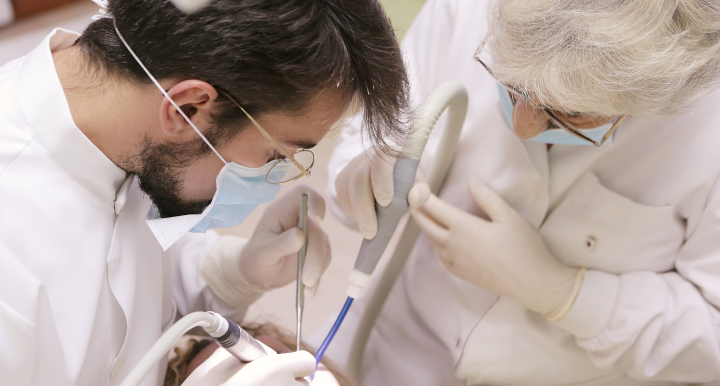Unlocking Efficiency: The Role of Dental Scribes in Modern Dentistry
Dentistry, a profession that demands a significant time investment, involves not only acquiring essential skills and knowledge but also nurturing patient relationships. Empathizing with patients, addressing their concerns, and dedicating quality time to their dental needs is paramount.
However, dentists often grapple with allocating substantial time to documentation and administrative tasks, which sometimes hampers their patient interactions. Documentation plays a pivotal role in dental care, serving as a comprehensive record of diagnostic information, health history, clinical notes, treatment provided, and patient communications.
Dental providers must ensure the completeness and accuracy of their documentation. This is essential to uphold patient care, legal requirements, and insurance claims. These records act as a crucial tool for tracking a patient's dental history, planning future treatments, and ensuring seamless care continuity. As a result, they significantly enhance the overall patient experience and treatment outcomes.

Dentists should review the previous visit's documentation, updating any unresolved issues, test results, or referrals. Additionally, documenting the clinical rationale is imperative for patient safety, future dental providers, and safeguarding against board complaints or malpractice claims.
Documenting patient interactions while the patient is still in the office or immediately after they leave proves highly beneficial. This approach not only optimizes the time spent with each patient but also increases the number of patients who can be seen daily, as it eliminates the need to later update electronic health records (EHR).
Dental scribes, professionals who assist dentists in documenting patient information, contribute to informed treatment decisions. They handle tasks like recording medical history, allergies, medications, and assisting with billing and coding, which can be time-consuming for dentists. Furthermore, they facilitate patient communication by taking notes during consultations and ensuring patients comprehend their treatment plans.

Dental scribes offer valuable assistance in multiple areas. They help document a patient's oral health status, including conditions like caries and periodontal disease, as well as dental procedures such as fillings, extractions, and root canal treatments. This documentation is vital for insurance billing and tracking a patient's progress over time.
Another significant area of support from dental scribes is in the documentation of implant procedures. These procedures require precise records of implant type, size, location, and orientation, all of which scribes can help accurately capture.
In addition to documentation, dental scribes also contribute to patient communication by taking notes during consultations and addressing patient inquiries about treatment options.
Nonetheless, employing scribes comes with additional operational costs. Some nuances in patient care may only be evident to the treating dentist. As an alternative, AI medical scribe software has emerged. It can automatically transcribe dentist dictations with remarkable accuracy, ensuring quick and comprehensive documentation without the need for extensive typing or handwriting. This innovative approach not only streamlines administrative tasks but also allows dentists to focus more on their primary responsibility – providing excellent patient care.

One example of an AI medical scribe is Tali. Tali is designed to simplify workflows and empower clinicians by capturing natural conversations between clinicians and patients with exceptional accuracy using advanced speech recognition models. It is fully compatible with telemedicine visits, offering a versatile solution for documenting notes, regardless of how clinicians interact with their patients. If you're interested in streamlining your documentation process and empowering your dental practice, consider giving Tali a try for free.
FAQ
Dental scribes are professionals who assist dentists in various administrative and documentation tasks. They play a crucial role in documenting patient information, including medical history, allergies, medications, and assisting with billing and coding. Dental scribes also take notes during patient consultations and ensure patients understand their treatment plans. Their support helps dentists focus more on patient care and optimizes the time spent with each patient.
AI medical scribe software, like Tali, offers an innovative alternative to traditional dental scribes. It can automatically transcribe dentist dictations with remarkable accuracy, eliminating the need for extensive typing or handwriting. This not only streamlines administrative tasks but also allows dentists to focus more on patient care. While traditional dental scribes come with additional operational costs, AI medical scribe software is cost-effective and provides quick and comprehensive documentation.
Using dental scribes or AI medical scribe software enhances the overall patient experience and treatment outcomes in several ways. They ensure the completeness and accuracy of documentation, which is essential for patient care, legal requirements, and insurance claims. These records serve as a crucial tool for tracking a patient's dental history, planning future treatments, and ensuring seamless care continuity. They also increase the number of patients that can be seen daily by optimizing time spent with each patient, and they facilitate better patient communication by ensuring patients understand their treatment plans and addressing inquiries. Additionally, scribes are valuable in documenting specific dental procedures and implant procedures, which require precise records. AI medical scribe software offers similar benefits and is a cost-effective alternative.
Documentation and Administrative Tasks?